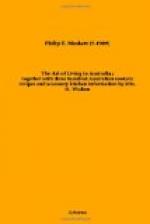But even when tobacco does not produce such marked ill effects, it is as well to remember that it has always a definite action from a gastronomic point of view. And it is this, that directly after the first draw of a cigarette, cigar, or pipe, the palate loses its delicacy of perception. As Sir Henry Thompson remarks, after smoke the power to appreciate good wine is lost, and no judicious host cares to open a fresh bottle from his best bin for the smoker. This is perfectly true; under such circumstances valuable wine would simply be thrown away. But, on the other hand, there is an unquestionable sympathy between coffee and tobacco, and a cup of Mocha blends harmoniously with choice Latakia. This is well recognised in the East; and throughout the Continent coffee and temperate habits go hand in hand with the cigar or cigarette. We must also agree with Sir Henry when he declares that smoke and alcoholic drinks are only found associated together in Great Britain and other northern nations, where there are to be found the most insensitive palates in Europe. It is a good thing, therefore, that the habits followed here are unknown to him, or else Australia would certainly have had a rap over the knuckles.
CHAPTER VII.
EXERCISE
This comes last alphabetically of the five essentials concerned in the maintenance of health—namely, ablution: the skin and the bath; bed-room ventilation; clothing; diet; and exercise—but it is none the less important on that account. Exercise may be defined as action of the body, whereby its organs and their functions are kept in a state of health. Each one of us has from the moment of his existence a certain stature allotted, as it were, to which he will attain. In this way some will be tall, others will be short, so that the height of the body is something quite beyond our control, as we know by the interrogation, “Which of you by taking thought can add one cubit to his stature?” But in contradistinction to height, we know that the muscles of the body can be developed and increased in size by use. It is by their action in exercise that the muscles are enlarged, hardened, and brought to their greatest state of perfection. And it is only by exercise, and by exercise alone, that they can be maintained at the acme of physical condition.
Now, in the same way that education develops and increases the power of the brain, so exercise has a similar effect on the body. When the muscles are strengthened, the beneficial effect is also participated in by the heart, lungs, and digestive organs, and thus the removal of worn-out material from the body is assisted. The effect of exercise is thus to remove used up products from the system, and so afford an opportunity for renewed material to take their place. Ceaseless changes are constantly going on throughout the body, and any part which has fulfilled its object is no longer necessary for the requirements of the system, in fact it becomes injurious. Its removal has to take place by one of the various outlets, and it is by exercise that its expulsion is greatly assisted. In this way exercise differs altogether from the part played by food. The latter is the introduction of nourishment into the system for the renewal of its wants, while exercise is the principal agent by which debris is eliminated.




